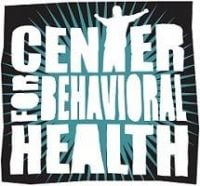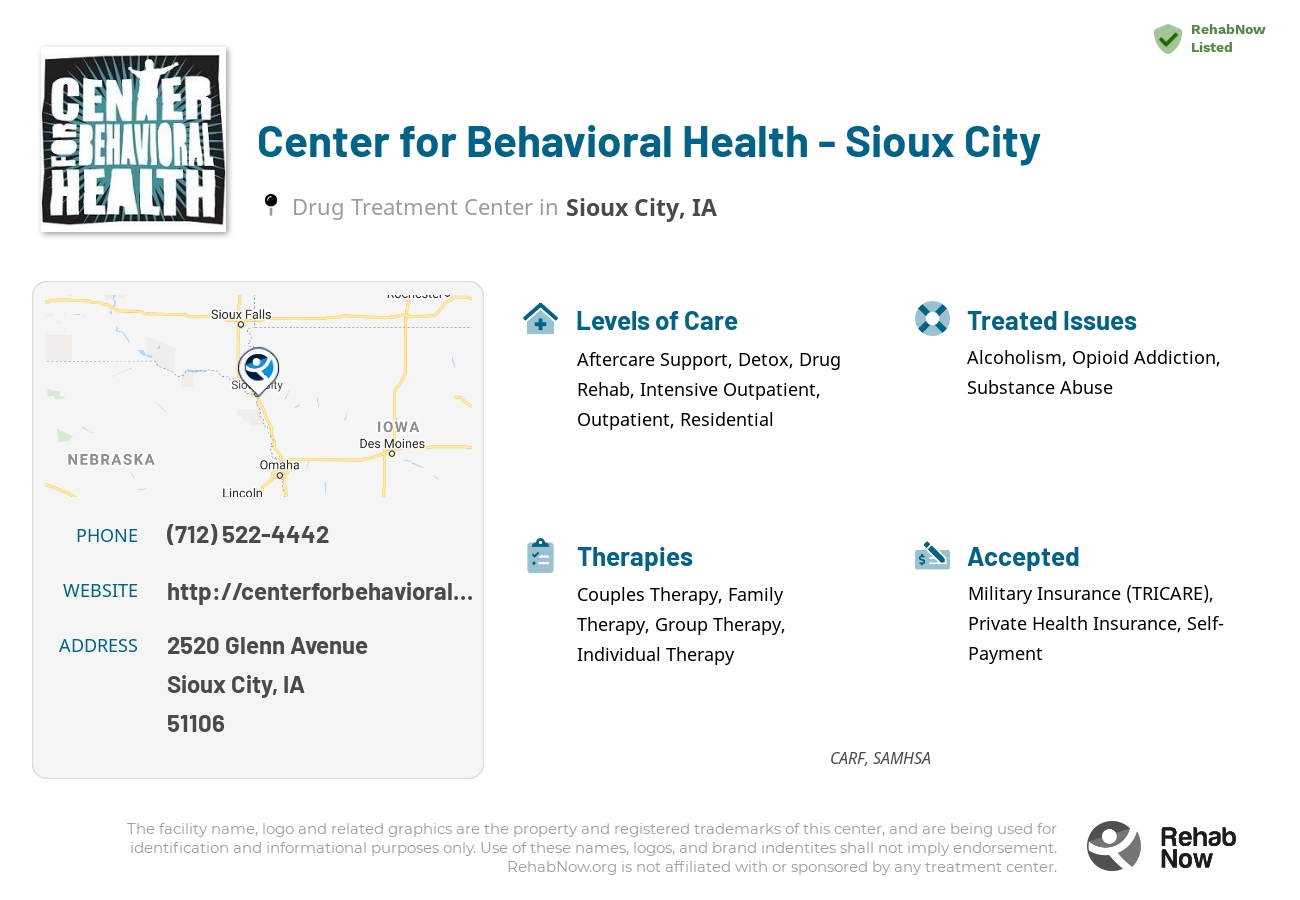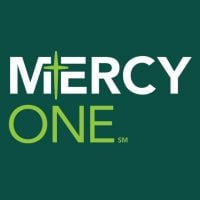Center for Behavioral Health - Sioux City
Drug Rehab Center in Sioux City, Iowa
The Center for Behavioral Health - Sioux City offers various therapeutic programs for addiction and substance abuse with a specialized team providing personalized and evidence-based treatment options, including comprehensive services for a range of addictive concerns and specialized treatment services for those with co-occurring disorders.
About This Iowa Facility
The Center for Behavioral Health – Sioux City in Sioux City, Iowa is a full-service facility offering various therapeutic programs to treat addiction and substance abuse. Their specialized, multi-disciplinary team of professionals provides personalized and evidence-based treatment options to help individuals and families struggling with addiction. Their mission is to partner with clients in a safe, supportive atmosphere that fosters lasting recovery and life satisfaction.
The Center for Behavioral Health – Sioux City offers comprehensive services for a range of addictive concerns. These services include outpatient treatment, intensive outpatient programming, alcohol and drug assessments, family education and support, individual and group counseling services, relapse prevention, and sober living. They also have specialized treatment services for those with co-occurring disorders, such as Dual Diagnosis Treatment and Pharmacotherapy, offering the most comprehensive approach for clients to address their mental health, addiction, and other comorbidity issues.
In addition to providing quality care for those suffering from addiction and substance abuse, the Center for Behavioral Health – Sioux City is also accredited by The Joint Commission and CARF International. They also have a commitment to providing the highest standard of care, making sure that clients and families receive the best possible services. They are also an outstanding provider in their community, providing professional services and programs to help individuals and families recover from addiction and move forward into a successful, healthy life.
Genders
Ages
Modality
Additional
Accreditations
SAMHSA

CARF
The Commission on Accreditation of Rehabilitation Facilities (CARF) is a non-profit organization that specifically accredits rehab organizations. Founded in 1966, CARF's, mission is to help service providers like rehab facilities maintain high standards of care.
Conditions and Issues Treated
People who abuse drugs are likely to suffer from an addiction, which can cause serious health problems. When it comes to helping drug abusers get sober, there are many options to choose from. It is essential to state that there is no “”correct”” way of doing things. People are different, and they need different types of help to get over their addiction.
Many people who struggle with opioid addiction need to attend specific programs like methadone , Suboxone or Vivitrol clinics.
These types of programs will provide the patient with legal, prescription medications that can help them overcome their cravings for illegal opioids like heroin or fentanyl . If the patient has a chronic condition like Hepatitis C, they must undergo treatment before they can begin taking these medications.
Levels of Care Offered at Center for Behavioral Health - Sioux City
This center offers a variety of custom treatment tailored to individual recovery. Currently available are Aftercare Support, Detox, Drug Rehab, Intensive Outpatient, Outpatient, Residential, with additional therapies available as listed below.
An addict may have to go through alcohol or drug withdrawal. While detox may be uncomfortable, it is not life-threatening. Detoxification allows the addict to rid the body of all traces of drugs or alcohol and gives the addict a clean slate for their recovery. In an inpatient or outpatient setting, detox can be managed medically.
Outpatient addiction treatment is beneficial for people who are able to function well in their day-to-day lives. It is recommended for people who are not yet ready to end their relationships with friends or family members who might be encouraging drug and alcohol use.
Intensive outpatient treatment is beneficial for:
- People who are able to attend treatment more than 3 times per week.
- People who do not meet the criteria for inpatient treatment.
- People who are able to contribute to their own recovery outside of the treatment center.
- People who are motivated towards recovery.
- People who are able to overcome addiction on their own without the need for higher levels of care.
Outpatient treatment programs provide drug and alcohol addiction treatment through individual sessions with a counselor, group therapy, 12-step meetings, and other activities to help individuals gain sober living skills. Most programs are designed for those individuals who have completed a medically supervised detoxification program and provide opportunities for clients to begin the process of early recovery.
Outpatient programs also offer a level of medical support as needed and psychological backing through therapy. Clients are encouraged to live at home, though there may be some flexibility regarding this requirement based on the circumstances and needs of each patient.
Outpatient treatment is perhaps the most common type of dual diagnosis program available. It does not pose a significant financial burden on patients. However, it is essential to note that outpatient treatment does not provide the support and supervision given in residential programs. Some addicts may need this level of support to maintain their sobriety.
Residential treatment programs are those that offer housing and meals in addition to substance abuse treatment. Rehab facilities that offer residential treatment allow patients to focus solely on recovery, in an environment totally separate from their lives. Some rehab centers specialize in short-term residential treatment (a few days to a week or two), while others solely provide treatment on a long-term basis (several weeks to months). Some offer both, and tailor treatment to the patient’s individual requirements.
People who have completed a rehab program often need continued support from the addiction treatment team in order to remain abstinent from drugs and alcohol. Aftercare can be beneficial for personal, social, and emotional growth.
Common aftercare options include:
- Individual Therapy – this type of addiction counseling is available on a one-on-one basis. This can be beneficial for people with a high degree of emotional turmoil and a strong desire to overcome addiction.
- Group Therapy – this type of addiction counseling is available in a group setting. This type of treatment can be beneficial for people who are unable to attend regular therapy appointments due to other responsibilities.
- Family Therapy – this type of addiction counseling is available to the family members of addicts. This can be beneficial for people who are unable to fully comprehend what their loved ones are experiencing due to addiction.
Therapies & Programs
Therapy sessions focused on the individual addict can provide much-needed guidance as they work toward overcoming their addiction. These types of sessions typically involve guidance from a therapist, who will help addicts identify and process their feelings and cravings.
During these sessions, addicts may develop plans for coping with the triggers that typically lead to relapse and learn how to avoid those triggers during their recovery process.
If you are looking for drug recovery, couples therapy can be a great option. This type of therapy can help rebuild trust and joy in relationships that may have been damaged by addiction. It can also help reduce the dysfunctional behavior in a relationship that may trigger addiction. A patient’s partner will be involved in the process. They can also benefit from therapy, especially if they are trying to live with an addict.
The main goal of family therapy for drug addiction is to create an environment where communication can occur without judgment, hostility, or blame that often occurs within a family.
Family therapy is a type of group problem-solving that aims to improve communication and relationships between the patient, their family, and sometimes friends. The therapist is with the family as they learn to communicate with each other differently, especially with the addict when s/he is using.
The family can learn to reduce their enabling behavior or rally together and support each other during tough times. The patient also learns how to deal with their addiction and maintain sobriety while interacting with the family.
Different types of addiction treatment services are available. Within this article, group therapy is of interest due to its high success rate compared to individual therapy. Group therapy settings are beneficial because they allow recovering addicts to build a strong support network.
Benefits of group therapy are:
- Reduces feelings of isolation
- Immediate access to social support in the form of fellow addicts in recovery
- Lowers risk of relapse
- Increases rate of sobriety
- Builds coping skills that can be applied to everyday life
Payment Options Accepted
For specific insurance or payment methods please contact us.
Is your insurance accepted?
Ask an expert, call (888) 674-0062
Center for Behavioral Health Associated Centers
Discover treatment facilities under the same provider.
- Center for Behavioral Health - Des Moines in Des Moines, IA
- Center for Behavioral Health - Davenport in Davenport, IA
Learn More About Center for Behavioral Health Centers
Additional Details
Specifics, location, and helpful extra information.
Sioux City, Iowa 51106 Phone Number(712) 522-4442 Meta DetailsUpdated November 25, 2023
Staff Verified
Patient Reviews
There are no reviews yet. Be the first one to write one.
Sioux City, Iowa Addiction Information
Iowa ranks 2nd lowest in the nation for illicit drug use, but 12% of its residents are still using these drugs every single year. Methamphetamines account for more than 90% of all drug-related prison admissions in Iowa. Alcohol is the most widely abused substance in the state, with 23% of residents admitting to heavy drinking.
The drug addiction problem in Sioux City, Iowa, is pretty bad. Around 5.9% of Sioux City residents reported using illicit drugs. Additionally, around 15.4% of residents reported binge drinking. 2,000 admissions to drug and alcohol treatment facilities were reported in the city in 2016. There are various treatment methods available in Sioux City, including medication-assisted treatment, talk therapy, inpatient treatment, and outpatient treatment. and 12-step programs.
Treatment in Nearby Cities
- Prairie City, IA (172.0 mi.)
- Corydon, IA (197.2 mi.)
- Hull, IA (51.5 mi.)
- Keokuk, IA (294.8 mi.)
- Adel, IA (134.6 mi.)
Centers near Center for Behavioral Health - Sioux City
The facility name, logo and brand are the property and registered trademarks of Center for Behavioral Health - Sioux City, and are being used for identification and informational purposes only. Use of these names, logos and brands shall not imply endorsement. RehabNow.org is not affiliated with or sponsored by Center for Behavioral Health - Sioux City.









